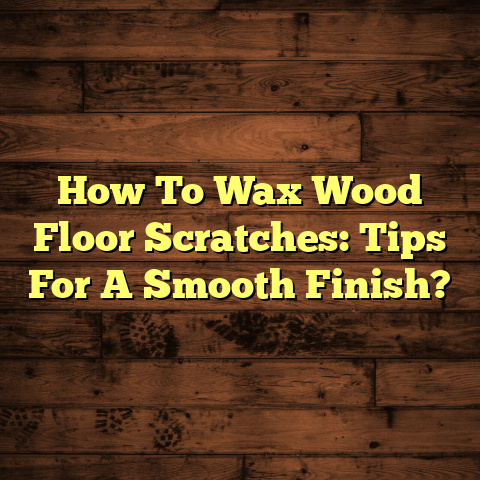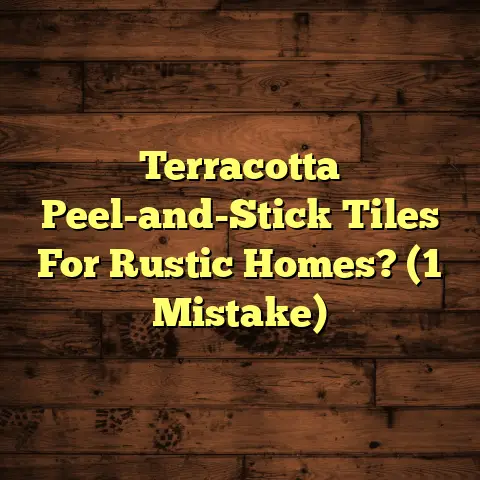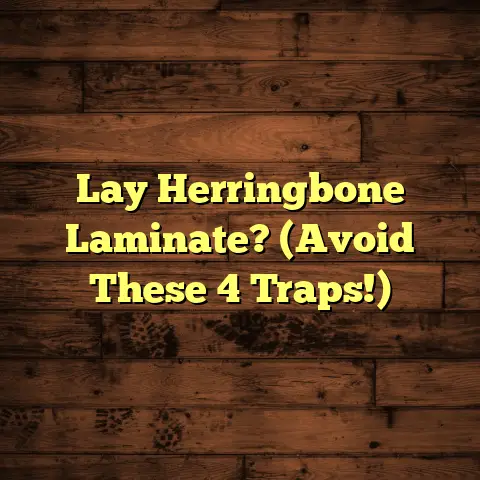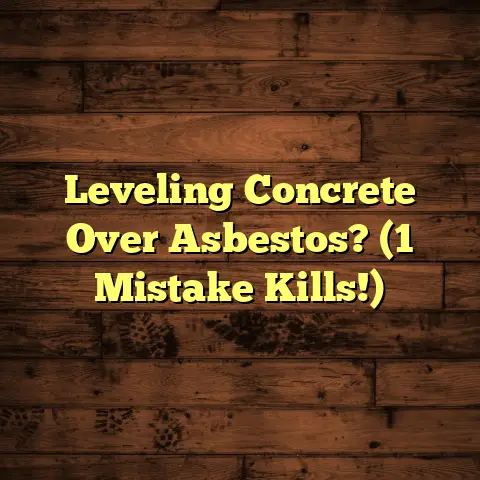Concrete Over Dirt Cost? (5 Price Factors!)
Well, you’re not alone! Concrete is seriously trending right now. People love it for its durability, clean look, and the fact that it can be super customized. Plus, with more and more folks getting into DIY and looking for sustainable options, concrete is a real winner.
But before you jump in, let’s talk about the real deal: the cost. Specifically, what’s it going to set you back to pour concrete over dirt? It’s not as simple as just dumping some mix and calling it a day. There are definitely some things to consider, and I’m here to break it all down for you, based on my years in the flooring business.
Overview of Concrete Over Dirt
Okay, so what exactly does “pouring concrete over dirt” mean? Basically, it’s exactly what it sounds like! You’re laying a concrete slab directly onto the existing soil.
The general process looks like this:
- Clear the Area: Get rid of any grass, rocks, or debris.
- Level and Compact: Make sure the soil is even and packed down tight.
- Add a Base (Optional): Sometimes, a layer of gravel is added for drainage.
- Pour the Concrete: Mix and pour the concrete to the desired thickness.
- Finish: Smooth, stamp, or texture the surface.
- Cure: Keep the concrete moist for several days to strengthen it.
Why do people do this? Well, concrete is tough! It can handle a lot of wear and tear, and it’s pretty low-maintenance. Plus, you can really get creative with colors, textures, and designs.
Now, let’s dive into the nitty-gritty: the price factors.
Price Factor 1 – Material Costs
The concrete mix itself is a big chunk of the cost. Concrete is usually measured in cubic yards (a cubic yard is 3 feet x 3 feet x 3 feet). The price per cubic yard can vary quite a bit depending on the type of concrete you choose.
Here’s a quick rundown:
- Standard Concrete: This is your basic, no-frills concrete. It’s great for foundations, sidewalks, and other general-purpose projects. Expect to pay around $100 to $150 per cubic yard.
- Decorative Concrete: This includes colored concrete, stamped concrete, and exposed aggregate. These options add a lot of visual appeal but come with a higher price tag, usually $150 to $300+ per cubic yard.
- High-Strength Concrete: If you need concrete that can handle heavy loads (like for a driveway), you’ll need a high-strength mix. This will cost you more, typically $150 to $250 per cubic yard.
Keep in mind that the more concrete you need, the higher the overall cost. If you’re doing a large patio, those cubic yards will add up quickly!
Pro Tip: Always order a little extra concrete than you think you need. It’s better to have too much than to run short in the middle of the pour. I usually recommend adding about 5-10% extra to your estimate.
Price Factor 2 – Site Preparation
Don’t underestimate the importance of prepping the site! This is where a lot of DIYers make mistakes. A poorly prepared site can lead to cracks, uneven surfaces, and other problems down the road.
Here’s what’s involved and what it might cost:
- Clearing: Removing grass, weeds, rocks, and debris. This might seem simple, but it can be time-consuming, especially if you have a lot of vegetation. If you hire someone to do it, expect to pay $50 to $100 per hour.
- Grading: Leveling the ground to ensure proper drainage. This is crucial! You don’t want water pooling on your concrete. Grading can cost $1 to $3 per square foot, depending on the complexity of the job.
- Compacting: Using a plate compactor to pack down the soil. This creates a stable base for the concrete. You can rent a plate compactor for around $50 to $100 per day.
- Excavation or Filling: If your site is significantly uneven, you might need to excavate (remove soil) or fill (add soil) to get it level. This can add a significant cost, especially if you need to bring in a lot of fill material. Expect to pay $10 to $30 per cubic yard for excavation or fill.
Real Story: I once had a client who skipped the compacting step to save money. A year later, their patio was a cracked, uneven mess. They ended up paying twice as much to have it fixed properly. Don’t make the same mistake!
Price Factor 3 – Labor Costs
Unless you’re a seasoned concrete pro, you’ll probably want to hire a contractor to do the actual pouring and finishing. Labor costs can vary widely depending on your location, the contractor’s experience, and the complexity of the project.
Here’s a general idea of what to expect:
- Hourly Rates: General labor can range from $30 to $50 per hour. Experienced concrete finishers can charge $50 to $100+ per hour.
- Project-Based Pricing: Some contractors will give you a flat rate for the entire project. This can be a good option if you want to know the total cost upfront.
- Regional Differences: Labor costs are generally higher in urban areas and on the coasts.
Example: In my area (Midwest), a basic concrete pour might cost $5 to $8 per square foot for labor. But in a place like California, that could easily be $10 to $15 per square foot.
Important: Always get multiple quotes from different contractors. Ask for references and check their reviews online. Don’t just go with the cheapest option – you want someone who knows what they’re doing.
Price Factor 4 – Additional Materials and Supplies
Besides the concrete mix, you’ll need a few other things to make the project successful:
- Rebar or Wire Mesh: These are used to reinforce the concrete and prevent cracking. Rebar costs around $0.50 to $1.00 per linear foot. Wire mesh is typically $50 to $100 per roll.
- Vapor Barrier: This is a plastic sheet that goes under the concrete to prevent moisture from seeping up and causing problems. Expect to pay $0.10 to $0.20 per square foot.
- Forms: These are used to contain the concrete while it’s being poured and shaped. You can buy pre-made forms or build your own out of wood. The cost of forms can vary widely depending on the size and complexity of the project.
- Fasteners: Screws, nails, or form stakes, around $20-$50
- Release Agent: To allow the forms to release easily, around $20-$30
Drainage Considerations: If your area has poor drainage, you might need to add a layer of gravel under the concrete to help water drain away. This will add to the overall cost, but it’s worth it to prevent water damage.
Price Factor 5 – Finishing and Sealing
The finishing touches are what really make your concrete look great and last longer.
Here are some common options and their associated costs:
- Smooth Finish: This is the most basic finish. The concrete is simply smoothed out with a trowel. This is usually included in the base price of the concrete pour.
- Textured Finish: This can be achieved by using a broom, stamp, or other tool to create a pattern on the surface. This adds visual interest and can also make the surface less slippery. Expect to pay $1 to $3 per square foot for a textured finish.
- Colored Concrete: Adding color to the concrete can really make it stand out. You can use integral color (mixed into the concrete) or stains (applied after the concrete is poured). Colored concrete can add $2 to $5 per square foot to the cost.
- Sealing: Sealing the concrete protects it from stains, water damage, and wear and tear. It’s a must-do! You can hire a professional to seal the concrete, or you can do it yourself. Sealing typically costs $0.50 to $1.50 per square foot.
Maintenance: Concrete needs to be resealed every few years to maintain its protection. This is a relatively inexpensive task that can significantly extend the life of your concrete.
Regional Variations in Costs
As I mentioned earlier, costs can vary quite a bit depending on where you live. Here are some examples:
- California: High labor costs and strict environmental regulations can make concrete projects more expensive. Expect to pay 20-30% more than the national average.
- Midwest: Generally lower labor costs and readily available materials make concrete projects more affordable.
- Northeast: Cold weather and shorter construction seasons can drive up costs.
Example Price Ranges:
| Region | Standard Concrete (per sq ft) | Decorative Concrete (per sq ft) |
|---|---|---|
| California | $8 – $12 | $12 – $20+ |
| Midwest | $6 – $10 | $10 – $16 |
| Northeast | $7 – $11 | $11 – $18 |
These are just estimates, of course. The best way to get an accurate idea of the cost in your area is to get quotes from local contractors.
Summary of Costs
Okay, let’s put it all together. Here’s a rough estimate of the total cost for a typical concrete over dirt project (assuming a 200 square foot patio):
- Materials: $800 – $1500
- Site Preparation: $200 – $600
- Labor: $1000 – $2000
- Additional Materials: $100 – $300
- Finishing and Sealing: $200 – $500
Total Estimated Cost: $2300 – $4900
Important Considerations:
- Unexpected Problems: Be prepared for unexpected problems, like hidden rocks or drainage issues. These can add to the cost.
- Permits: You might need a permit to pour concrete, depending on your local regulations. Check with your city or county to find out. Permit fees can range from $50 to $200+.
- DIY vs. Professional: Doing it yourself can save you money on labor, but it also comes with risks. If you’re not experienced, you could end up making costly mistakes.
Conclusion
Pouring concrete over dirt can be a great way to create a durable, attractive surface for your home or yard. But it’s important to understand the costs involved before you start the project.
By considering the five price factors I’ve outlined – material costs, site preparation, labor costs, additional materials, and finishing – you can create a realistic budget and avoid any surprises.
Do your research, get multiple quotes, and don’t be afraid to ask questions. With a little planning, you can achieve the concrete project of your dreams without breaking the bank!





